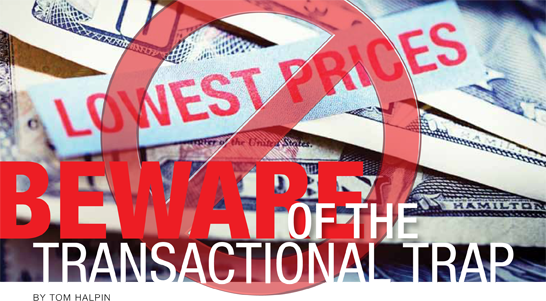Beware of the Transactional Trap

By Tom Halpin
Many companies and sales people are trapped in a transactional selling cycle using price as their primary tool to solicit and close business. Of course, the result is that customers treat them as a quote or proposal factory. Transactional selling cycles are characterized by a commoditization of products and services with an over-weighted emphasis on price. In these scenarios, the sales team’s primary line is, “Can we have an opportunity to quote?” The sales manager’s primary line is,“The more business we quote, the more business we book.” The buyer’s line is, “What’s your price?”
This suboptimal cycle of behavior conditions prospects, customers, and salespeople to engage in a continuous “bid-quote” loop where products or services are reduced to a price and lead time. The result is price erosion and a massive drain on selling, quoting, and estimating resources until someone or something breaks the cycle of behavior.
To reverse transactional selling behavior, companies must review their selling process, sales toolbox, and message the sales team is taking into the marketplace. Ideally, companies should differentiate in a way that creates value and business outcomes to customers. The following is a story of two competitors and their different approaches to selling through a distributor.
Transactional Manufacturing vs. ValueWise
Transactional Manufacturing supplies widgets and has a broad catalog offering that it sells through a global distribution network. To support distribution, Transactional uses both direct sales people and independent reps. Transactional is known for aggressive discounting both at the distributor and end-user level. Product quality is satisfactory, but the company is not considered a market leader.
Transactional’s national sales manager, Will Quoteman, is excited to make a sales call on Ace Distribution’s general manager, Reggie Truth, in Erie, Pa. At one time, Ace Distribution was Will’s largest distributor, but has since left and become the No. 1 distributor for Transactional’s biggest competitor, ValueWise. Will has an aggressive program to present to Reggie at Ace.
During the meeting, Will unveils his aggressive discount program that, on paper, represents a far better deal than Ace is currently receiving from ValueWise. In addition, Transactional is willing to place consigned inventory on Ace’s shelf and extend payment terms of 180 days. From a product comparison perspective, Transactional’s product coverage is equal to ValueWise but doesn’t offer the brand awareness. ValueWise is considered one of the top three brands in its space.
As Will closed his presentation, he asked for feedback from Reggie. Reggie expressed his appreciation for Will’s visit and offer, but that Ace would not be leaving ValueWise. Will learned the following about the Ace-ValueWise relationship and the basis on which Ace left Transactional Manufacturing years ago:
ValueWise and Ace engage in an annual mutual action plan that covers all six of Ace’s branches. As part of that plan, they agree on an annual sales goal with a plan to achieve it. The mutual action plan is driven by John Rock, principal at Rock Enterprises, ValueWise’s local manufacturer’s rep firm. Reggie and John commit to executing the plan. John pulls in his ValueWise regional manager when factory support or position power is needed.
In addition to the annual sales goal, ValueWise and Ace create a simple dashboard to monitor the relationship.
The measurables include:
- Number of new customer activations
- Ace’s gross margin on ValueWise products
- ValueWise sales dollars by Ace sales territory
- ValueWise point of sale information (sales by ZIP code)
- ValueWise on-time delivery performance
- ValueWise fill rate % (in-stock vs. out of stock)
- ValueWise return rate (Number of occurrences and dollars)
The dashboard shows actual to goal, actual to prior year, and year-over-year change in percent.
Within the mutual action plan, both parties agree to action items that support their overall goal.
Jointly, Ace and ValueWise agree to:
- An annual sales goal
- Publish a dashboard to monitor progress toward goal and plan effectiveness
- Engage in target account planning to grow their mutual business
- A marketing plan to support their sales efforts
- Monthly reporting and quarterly reviews of the mutual action plan
- The plan is documented and signed by leadership
Ace agrees to the following:
- To stock ValueWise product at all branches, especially the most popular SKUs
- To provide ValueWise point of sale information monthly
- To pay invoices within 30 days
- Make their inside and outside sales teams accessible to ValueWise’s local rep agency
- Full sales team participation in ValueWise lunch-and-learns two times per year at all branches
- Engage in target account planning and make joint sales calls with ValueWise reps
- Be responsive and follow through on open action items
John Rock, ValueWise’s manufacturer’s rep, agrees to the following:
- Conducts educational sessions for Ace’s inside and outside sales people at all branches twice per year. John schedules ValueWise support personnel as needed.
- ValueWise provides marketing dollars that enable Ace to promote ValueWise in digital, print, point-of-sale displays or customer-specific events (marketing dollars are a percent of Ace’s prior year purchases to ValueWise)
- ValueWise extends Ace its best distributor discount structure and agrees to provide contract pricing for competitive situations
- Support Ace’s selling efforts to win business
- Provide high-quality product
- Be responsive and follow through on open action items.
Will realized that his aggressive terms were no match for the relationship John Rock and ValueWise had built at Ace. ValueWise was training Ace’s inside and outside salespeople and helping them sell more effectively, multiplying their collective influence. ValueWise had the confidence of Ace’s leadership and sales team based on three years of sales growth, and the local rep agency (Rock Enterprises) was so firmly entrenched that no set of aggressive terms could possibly dislodge them. The obvious business outcome ValueWise created was sales growth but, more than that, a business process backed by the commitment and resources of both parties. They were an unstoppable force.
In summary, Will was hoping his transactional offer would resonate with a transactional distributor. It didn’t work. Ace and ValueWise are aligned because they know price is one element of a business relationship. Creating value generally requires a larger vision and an investment of time, talent, and capital to support a desired business outcome, and ValueWise and Ace were making that happen through their mutual action plan.
The pushback I often hear from transactional sellers is, “Of course we’re transactional. Our products are commodities.” My response is that most companies have the opportunity to build a differentiation strategy through their product or service platform to create a measurable or emotional benefit to the customer. However, it’s difficult to be creative if you’re stuck in the craziness of the transactional bid-quote loop. If you’re willing to be creative and put forth the effort to understand your customer’s business at a deeper level, you can build innovative solutions that provide value to your customers. The result will be that price becomes one element of a larger decision-making process for the customer, rather than the entirety of it.
Commoditization of products and services are a natural part of competitive markets. Take it to the bank, it’s not going to change anytime soon. So, what’s your plan? Continue to be transactional? Or think differently like ValueWise to create business outcomes for your customers? For salespeople, the difference could mean millions of dollars in income over your lifetime. For companies, the difference could change your growth trajectory, profit outlook, and provide the ability to gainfully employ people to help serve your growing customer base.

Tom Halpin is a Michigan-based business consultant who helps manufacturers and distribution companies grow their sales predictably. Reach him at tom@thehalpingroup.net.
This article originally appeared in the May/June 2016 issue of Industrial Supply magazine. Copyright 2016, Direct Business Media.













